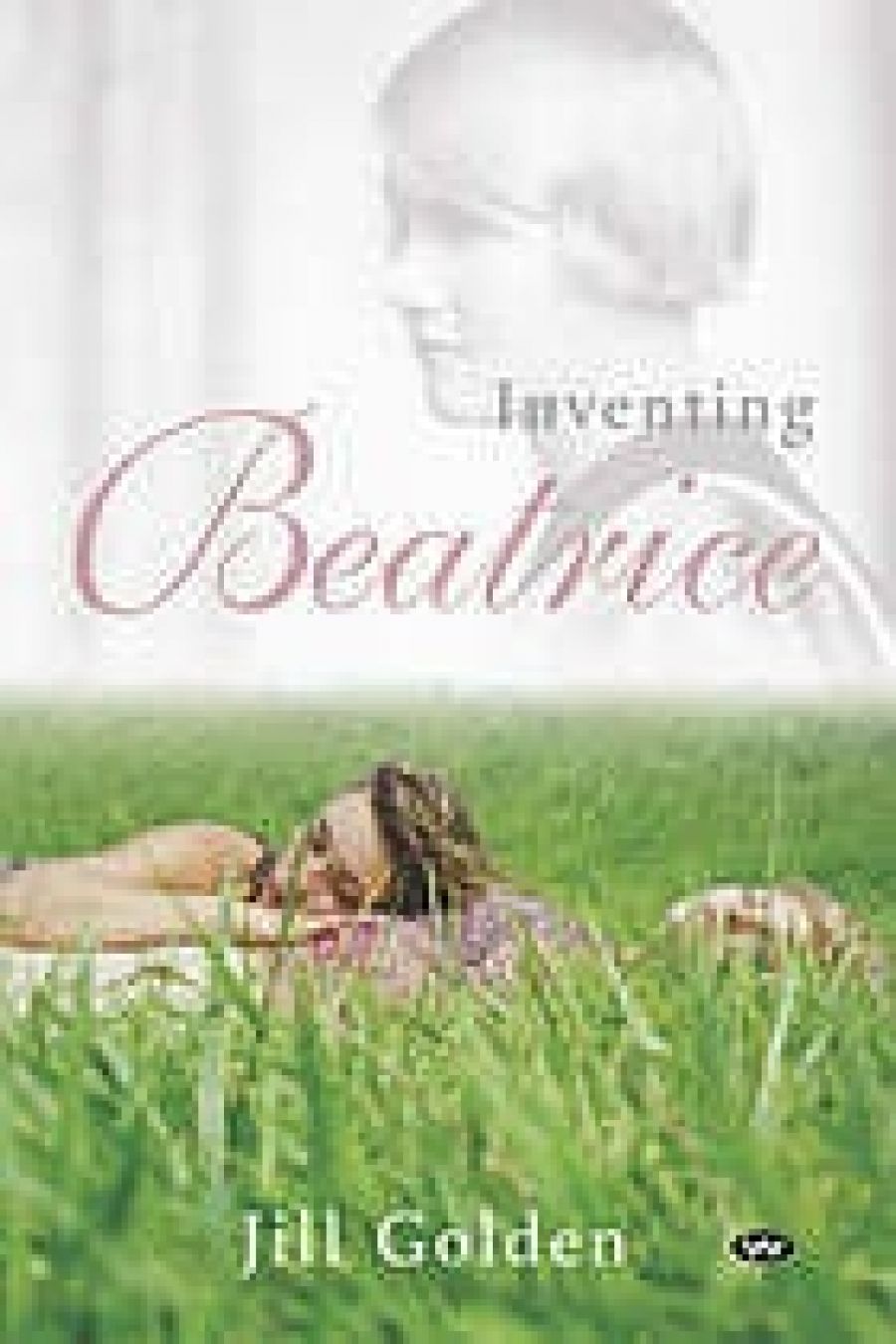
- Free Article: No
- Contents Category: Fiction
- Review Article: Yes
- Online Only: No
- Custom Highlight Text:
Jill Golden’s Inventing Beatrice is a fictionalised account of the life of her mother, Beatrice (or B). This is life writing at its most precarious, right out there on the borderline of ‘fact’ and the ‘inventing’ of the title. Is it a novel or a biography? The media release labels it a novel but concedes that it ‘crosses the genres of biography and autobiography, fiction and non-fiction, speaking in several voices’. What is certain is that the point of view, and of judgment, is constantly shifting as the narrator sets out to unravel the enigma of her mother’s emotional frigidity and to find out the real circumstances of a childhood that, she feels, has destroyed her. Why did B send her three small daughters – the youngest only eight months old – away from home for more than five long years? They spend this time in foster care, then boarding school.
- Book 1 Title: Inventing Beatrice
- Book 1 Biblio: Wakefield Press, $39.95 hb, 351 pp
The first long section dramatises B’s membership of Mob, a euphoric group of female university students in the 1920s. At this time, all of B’s movements are controlled by her tyrannical Pa, an elderly Methodist minister who specialises in petulant tirades and cruel punishments. Even the most harmless outing is forbidden lest it upset Pa and affect his health. B allows this with a certain amount of pride in her own goodness, a preview of the self-abnegation she will practise in her marriage. Her choice of Katherine Mansfield – another self-denying wife – for literary study is also highly significant.
The members of Mob are obsessed with their literary studies, from Chaucer to the Romantic poets (Mansfield is considered almost too modern by their Professor). They are also besotted with each other, and indulge in passionate and lingering kisses, exclusive pairing and concomitant jealousy. Members keep diaries and letters, write comment on each other’s diaries and endlessly analyse each other’s emotional states. I am not sure (nor are they) whether these young women are rehearsing for future heterosexuality, or excluding themselves from it. At least one declares that the love between women in the group has spoiled her for any sexual contact with a man. Though B (and the narrator) look back on her membership of Mob as the happiest period of her life, there are inherent dangers. Time moves on and a man, the charismatic Tom Scott, is introduced to the group by Delia, its central personality.
According to the narrator, Tom and Delia ‘weave a honey-sticky net that will catch B and hold her fast until the honey hardens into steel’. Delia stage-manages Tom’s attraction to B, yet enjoys a sexual fling with him just before the wedding, expecting B to understand this in the name of ‘freedom’, ‘equality’ and ‘honesty’. This is an argument that Tom will exploit again and again as, within his marriage to B, he parades a series of extramarital affairs. He even brings his mistress, Heidi, to share his bed and their home. Yet B’s early sexual affairs, when she has taken him at his word, are used to demonstrate, according to Tom, her ‘moral inferiority’.
The second long section, ‘Beatrice Speaking’, gives B a voice. She details, month by month, the conditions of her married life from July 1945 to January 1948, a crucial time for the exclusion of the children. Tom has been offered an exciting, year-long posting to Europe on condition that B take over his teaching duties for the year. Living in a cramped flat at Vaucluse, B persuades herself that farming out the three children – Polly, Jesse and the baby Rose – is the only way that she can work. She spends hours each weekend catching trains, trams and buses to visit the children or bring them home for weekends and holidays.
Golden tightens the narrative screws. Tom’s absence grows longer, his demands increase, B’s sacrifices are ignored and he treats her with cold disdain, his forte the stinging backhander dressed up as a compliment:
you were so appallingly inept and flat-footed in social relation-ships that I was sometimes embarrassed to be with you. You can imagine my pleasure in knowing that you’re doing better now.
B takes a second job, rents out another room, works harder, puts the two oldest children in boarding school, sends baby Rose further away and comforts Heidi, who, having slept with a man-friend and disclosed it in the name of ‘honesty’ and ‘trust’, is also branded ‘morally inferior’.
This is a powerful and desolate story told in an extraordinarily vivid way. It is relieved only by the joy in literature and each other shown by the members of Mob; they will cherish their memories of their time together for the rest of their lives. In Tom Scott, Golden has created one of the most unpleasant male characters in Australian fiction. He is a truly despicable manipulator, seen eventually even by B as a ‘monstrous self-deceiver’. But B is a party to her own oppression, acceding to the outrageous demands of first Pa, then Tom, through pride in her own moral high-mindedness and ability to endure. The children, deprived of closeness and love when they need it most, are the real victims. There were other options. In case we miss this point, Golden makes it clear: ‘They did have choices. Each of them [B and Tom] could have said No, I will not do that. They are accountable.’


Comments powered by CComment